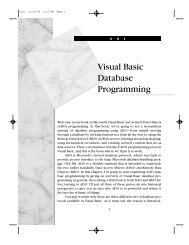SOCIAL PROBLEMS: A Down-to-Earth Approach, 8/e
SOCIAL PROBLEMS: A Down-to-Earth Approach, 8/e
SOCIAL PROBLEMS: A Down-to-Earth Approach, 8/e
You also want an ePaper? Increase the reach of your titles
YUMPU automatically turns print PDFs into web optimized ePapers that Google loves.
“But you don’t understand! It’s not<br />
a baby!” Lisa shouted once again.<br />
She felt desperate, at her wit’s<br />
end. The argument with her grandmother<br />
seemed <strong>to</strong> have gone on<br />
forever.<br />
With tears in her eyes, her<br />
grandmother said, “You don’t know what you’re doing,<br />
Lisa. You’re taking the life of an innocent baby!”<br />
“You’re wrong! There’s only one life involved here—<br />
mine!” replied Lisa. “It’s my body and my life. I’ve<br />
worked <strong>to</strong>o hard for that manager’s job <strong>to</strong> let this pregnancy<br />
ruin everything.”<br />
“But Lisa, you have a new responsibility—<strong>to</strong> the<br />
baby.”<br />
The Sociological Imagination<br />
Like Lisa and her grandmother, when we have problems, we usually see them in highly<br />
personal—and often emotional—terms. Our perspective is limited primarily <strong>to</strong> our<br />
immediate situation, and without a sociological imagination we fail <strong>to</strong> see the broader context<br />
in which our problems arise. Because we seldom connect our personal lives with the<br />
larger social context, like Lisa and her grandmother, we tend <strong>to</strong> blame ourselves and one<br />
another for our troubles.<br />
What Is the Sociological Imagination?<br />
“But you don’t<br />
understand!<br />
It’s not a baby!”<br />
The term sociological imagination refers <strong>to</strong> looking at people’s behavior and attitudes<br />
in the context of the social forces that shape them. C. Wright Mills, the sociologist who<br />
developed this concept, emphasized that changes in society influence our lives profoundly.<br />
As with Lisa and her grandmother, we get caught on various sides of social issues. Until<br />
1973, legal abortions were not available in the United States. At that time, <strong>to</strong>o, almost<br />
everyone thought of abortion as a despicable act. When the law changed, however, and<br />
doc<strong>to</strong>rs were allowed <strong>to</strong> perform abortions, many people’s attitudes changed. The<br />
sociological imagination, then, is an emphasis on how the larger events swirling around us<br />
influence how we think, feel, and act.<br />
APPLYING THE SOCIOLOGICAL IMAGINATION TO PERSONAL TROUBLES. The his<strong>to</strong>rical forces<br />
that are changing our society also have an impact on our own lives. As you know, a major<br />
trend in global capitalism is <strong>to</strong> export jobs <strong>to</strong> countries where workers earn just a dollar or<br />
two a day. This global force is not something abstract, but, instead, something that changes<br />
“Don’t judge my life by your<br />
standards. You never wanted a career.<br />
All you ever wanted was <strong>to</strong><br />
raise a family.”<br />
“That’s not the point,” her<br />
grandmother pressed. “You’re carrying<br />
a baby, and now you want <strong>to</strong><br />
kill it.”<br />
“How can you talk like that? This is just a medical<br />
procedure—like when you had your galls<strong>to</strong>nes taken out.”<br />
“I can’t believe my own granddaughter is saying<br />
that butchering a baby is like taking out galls<strong>to</strong>nes!”<br />
Lisa and her grandmother looked at each other,<br />
knowing they were worlds apart. They both began <strong>to</strong> cry<br />
inside.<br />
THE SOCIOLOGICAL IMAGINATION 3
















